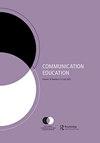通过应用创伤知情实践建立复原力
IF 0.8
Q3 COMMUNICATION
引用次数: 0
摘要
复原力被概念化为一种沟通过程,“存在于日常生活中,处于日常损失的时刻,以及战争、灾难、死亡和大规模暴力造成的非同寻常的深刻破坏。这些事件可能引发压力、焦虑或创伤等反应”(Buzzanell&Houston,2018,第2页)。Afifi(2018)将社会关系描述为在影响个人如何应对逆境方面发挥着重要作用。人际沟通研究倾向于研究与韧性相关的沟通过程,如情感和社会支持,以此作为改善心理健康、减少孤独感、提高关系满意度和质量的手段。因此,我们的社会关系有可能对我们如何适应压力事件产生积极或消极的影响。Fox和Walter(2022)指出,复原力是个体因素和环境因素相互作用的结果。在个人层面上,那些表现出自我效能感、灵活性和应对策略使用等特征的人在遇到挑战性环境时更有可能坚持下去。相反,发现难以应对工作中的情感需求的人更有可能经历压力和与工作相关的倦怠。影响教师适应力的环境因素包括新教师支持的可用性、辅导机会、与同事、管理人员和学生的积极关系,以及积极的机构文化的存在。此外,那些表现出高度韧性的人在面对压力时也往往保持强烈的幸福感。本文章由计算机程序翻译,如有差异,请以英文原文为准。
Building resilience by applying trauma-informed practices
Resilience is conceptualized as a communication process “situated in everyday life at ordinary moments of loss as well as at extraordinary and profound disruptions caused by war, disaster, death, and mass violence. These events can provoke responses such as stress, anxiety, or trauma” (Buzzanell & Houston, 2018, p. 2). Afifi (2018) describes social relationships as playing a significant role in influencing how individuals respond to adversity. Interpersonal communication research tends to examine communication processes related to resilience such as affection and social support as means by which to improve mental health, reduce loneliness, and enhance relationship satisfaction and quality. As such, our social relationships have the potential to positively or negatively influence how we adapt to stressful events. Fox andWalter (2022) indicate resilience results from an interplay between individual and environmental factors. On an individual level, those exhibiting traits such as selfefficacy, flexibility, and use of coping strategies are more likely to persevere when encountering challenging circumstances. Conversely, individuals finding it difficult to cope with the emotional demands of their work are more likely to experience stress and job-related burnout. Environmental factors influencing teacher resilience include the availability of new teacher support, opportunities for mentoring, positive relationships with colleagues, administrators, and students, as well as the existence of a positive institutional culture. Furthermore, those exhibiting high levels of resilience also tend to maintain a strong sense of well-being when confronted with stress.
求助全文
通过发布文献求助,成功后即可免费获取论文全文。
去求助
来源期刊

COMMUNICATION EDUCATION
EDUCATION & EDUCATIONAL RESEARCH-
CiteScore
3.10
自引率
34.80%
发文量
47
期刊介绍:
Communication Education is a peer-reviewed publication of the National Communication Association. Communication Education publishes original scholarship that advances understanding of the role of communication in the teaching and learning process in diverse spaces, structures, and interactions, within and outside of academia. Communication Education welcomes scholarship from diverse perspectives and methodologies, including quantitative, qualitative, and critical/textual approaches. All submissions must be methodologically rigorous and theoretically grounded and geared toward advancing knowledge production in communication, teaching, and learning. Scholarship in Communication Education addresses the intersections of communication, teaching, and learning related to topics and contexts that include but are not limited to: • student/teacher relationships • student/teacher characteristics • student/teacher identity construction • student learning outcomes • student engagement • diversity, inclusion, and difference • social justice • instructional technology/social media • the basic communication course • service learning • communication across the curriculum • communication instruction in business and the professions • communication instruction in civic arenas In addition to articles, the journal will publish occasional scholarly exchanges on topics related to communication, teaching, and learning, such as: • Analytic review articles: agenda-setting pieces including examinations of key questions about the field • Forum essays: themed pieces for dialogue or debate on current communication, teaching, and learning issues
 求助内容:
求助内容: 应助结果提醒方式:
应助结果提醒方式:


